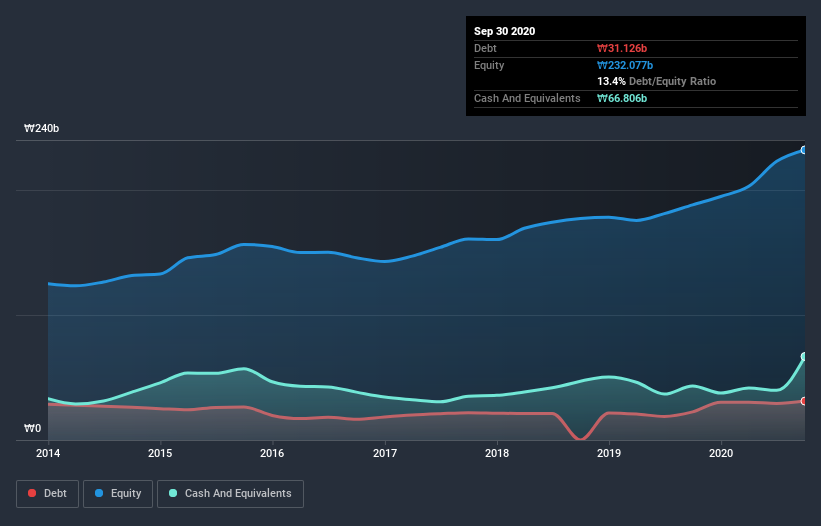Howard Marks put it nicely when he said that, rather than worrying about share price volatility, 'The possibility of permanent loss is the risk I worry about... and every practical investor I know worries about.' So it seems the smart money knows that debt - which is usually involved in bankruptcies - is a very important factor, when you assess how risky a company is. As with many other companies TSE Co., Ltd (KOSDAQ:131290) makes use of debt. But the real question is whether this debt is making the company risky.
Why Does Debt Bring Risk?
Generally speaking, debt only becomes a real problem when a company can't easily pay it off, either by raising capital or with its own cash flow. Ultimately, if the company can't fulfill its legal obligations to repay debt, shareholders could walk away with nothing. However, a more frequent (but still costly) occurrence is where a company must issue shares at bargain-basement prices, permanently diluting shareholders, just to shore up its balance sheet. Of course, plenty of companies use debt to fund growth, without any negative consequences. The first thing to do when considering how much debt a business uses is to look at its cash and debt together.
View our latest analysis for TSE
How Much Debt Does TSE Carry?
You can click the graphic below for the historical numbers, but it shows that as of September 2020 TSE had ₩30.7b of debt, an increase on ₩22.5b, over one year. But on the other hand it also has ₩66.8b in cash, leading to a ₩36.1b net cash position.

A Look At TSE's Liabilities
According to the last reported balance sheet, TSE had liabilities of ₩59.7b due within 12 months, and liabilities of ₩15.5b due beyond 12 months. Offsetting this, it had ₩66.8b in cash and ₩49.5b in receivables that were due within 12 months. So it actually has ₩41.1b more liquid assets than total liabilities.
This short term liquidity is a sign that TSE could probably pay off its debt with ease, as its balance sheet is far from stretched. Succinctly put, TSE boasts net cash, so it's fair to say it does not have a heavy debt load!
Better yet, TSE grew its EBIT by 284% last year, which is an impressive improvement. That boost will make it even easier to pay down debt going forward. There's no doubt that we learn most about debt from the balance sheet. But you can't view debt in total isolation; since TSE will need earnings to service that debt. So if you're keen to discover more about its earnings, it might be worth checking out this graph of its long term earnings trend.
Finally, a company can only pay off debt with cold hard cash, not accounting profits. TSE may have net cash on the balance sheet, but it is still interesting to look at how well the business converts its earnings before interest and tax (EBIT) to free cash flow, because that will influence both its need for, and its capacity to manage debt. Over the last three years, TSE reported free cash flow worth 14% of its EBIT, which is really quite low. For us, cash conversion that low sparks a little paranoia about is ability to extinguish debt.
Summing up
While it is always sensible to investigate a company's debt, in this case TSE has ₩36.1b in net cash and a decent-looking balance sheet. And we liked the look of last year's 284% year-on-year EBIT growth. So we don't think TSE's use of debt is risky. The balance sheet is clearly the area to focus on when you are analysing debt. But ultimately, every company can contain risks that exist outside of the balance sheet. Consider risks, for instance. Every company has them, and we've spotted 2 warning signs for TSE you should know about.
At the end of the day, it's often better to focus on companies that are free from net debt. You can access our special list of such companies (all with a track record of profit growth). It's free.
If you’re looking to trade TSE, open an account with the lowest-cost* platform trusted by professionals, Interactive Brokers. Their clients from over 200 countries and territories trade stocks, options, futures, forex, bonds and funds worldwide from a single integrated account. Promoted
Valuation is complex, but we're here to simplify it.
Discover if TSE might be undervalued or overvalued with our detailed analysis, featuring fair value estimates, potential risks, dividends, insider trades, and its financial condition.
Access Free AnalysisThis article by Simply Wall St is general in nature. It does not constitute a recommendation to buy or sell any stock, and does not take account of your objectives, or your financial situation. We aim to bring you long-term focused analysis driven by fundamental data. Note that our analysis may not factor in the latest price-sensitive company announcements or qualitative material. Simply Wall St has no position in any stocks mentioned.
*Interactive Brokers Rated Lowest Cost Broker by StockBrokers.com Annual Online Review 2020
Have feedback on this article? Concerned about the content? Get in touch with us directly. Alternatively, email editorial-team@simplywallst.com.
About KOSDAQ:A131290
TSE
Provides semiconductor test solutions in South Korea and internationally.
Flawless balance sheet with proven track record.
Similar Companies
Market Insights
Community Narratives



